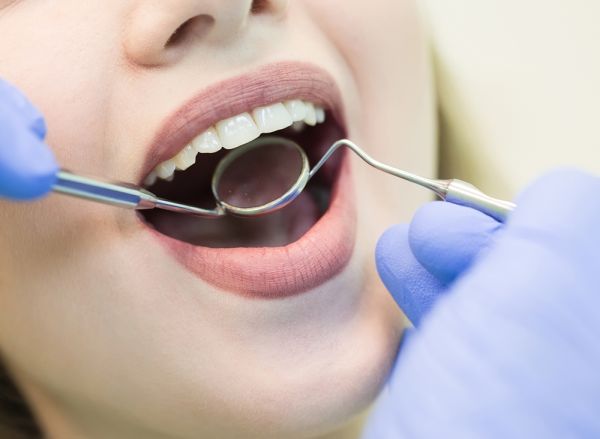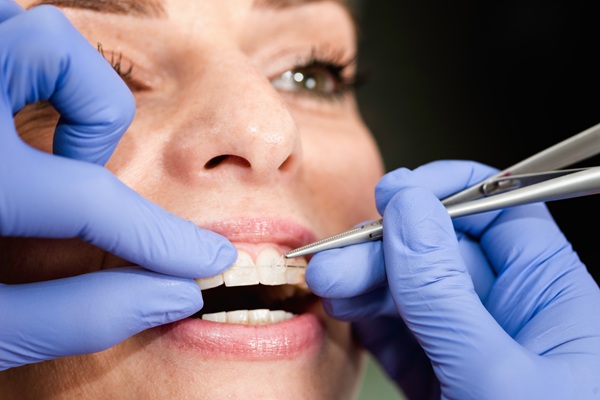Should I Get Dental Crowns or Veneers?

Dental crowns and veneers are popular treatment options for people who have cracked a tooth, want to make cosmetic changes to their teeth, or are looking to step up their smiles. Although both of these procedures can positively influence the appearance of a tooth, they are two different solutions that potential patients should weigh carefully.
Key differences between dental crowns and veneers
Dental crowns are used to cover an entire tooth. This means that every part of the tooth above the gum line is encased in porcelain, which helps strengthen the tooth and improve its appearance.
Like the name would suggest, veneers only cover the front side of a tooth. This porcelain front allows for changes in the color and shape of the tooth.
When deciding whether to opt for dental crowns or veneers, there are a few key factors to keep in mind:
The health of the teeth
Veneers are typically placed on teeth that are healthy and strong. Porcelain veneers tend to be weak and do not strengthen or otherwise alter the integrity of a tooth. Patients who have generally healthy teeth who are seeking a change in color, shape or alignment should consider porcelain veneers.
Crowns, on the other hand, are helpful for protecting teeth that are cracked or otherwise damaged. While crowns can still adjust the shape and color of a tooth, they are also able to strengthen and rebuild teeth that are severely decayed or broken. If a tooth is unhealthy, a crown is a better solution than a veneer.
The purpose of the procedure
Patients should consider the purpose for which they are considering either procedure, as well as the health of their teeth when making a decision between dental crowns and veneers.
For teeth that are pretty strong and only require slight cosmetic changes, veneers are probably best. Veneers are a good solution for issues that are strictly aesthetic in nature.
For broken teeth that need support or restoration, crowns are a better option. A dental crown will not only improve the way a tooth looks, but it will also rebuild the structure of a tooth and allow patients to use the tooth the way they would naturally.
If there are no underlying issues or problems with a patient’s teeth, veneers are a good treatment option. However, if a tooth is in desperate need of repair or protection, patients should choose a dental crown.
The amount of tooth reduction
Veneers require less tooth reduction than dental crowns. In fact, in some situations, no trimming is needed at all. Patients who have minor cosmetic issues to fix should probably opt for a procedure that does not require much tooth reduction.
According to Hawthorne East Dental, placing a crown requires anywhere from 63% to 76% of the tooth to be trimmed. If a tooth is severely damaged, this tooth reduction can help protect the healthy parts of the tooth that remain. However, this is not ideal if the tooth is relatively healthy.
Choosing the right dental procedure
In order to choose the dental procedure that will work best for their own unique needs, patients should consider the purpose of the procedure, the health of their teeth, and the amount of enamel trimming that will be involved.
A dentist can help provide more information and make sure patients understand the difference between veneers and dental crowns before they make a decision.
Request an appointment here: http://www.riversdentistry.com or call Rivers Family Dentistry at (979) 710-2216 for an appointment in our Bryan office.
Check out what others are saying about our services on Yelp: Read our Yelp reviews.
Related Posts
Dental crowns stand out among dental restorations as versatile and effective solutions for various oral health issues. A dental crown, or "cap," is designed to cover and encase a damaged or weakened tooth, restoring its strength, function, and appearance.Over the years, advancements in dental technology have led to the development of various types of dental…
Advancements in orthodontics make it possible to achieve a straighter smile without the noticeable appearance of traditional metal braces. Clear braces provide an option that blends in with natural teeth, offering a more subtle approach to orthodontic treatment. Their translucent or tooth-colored materials allow individuals to correct alignment issues while maintaining a simple aesthetic.Clear braces…
Endodontics is a branch of dentistry that focuses on studying, diagnosing, and treating problems affecting teeth pulp. The most commonly performed endodontic treatment used in dentistry is the root canal, and it allows dentists to save teeth that have severe damage or decay.Root canal treatments are often the last defense when saving a tooth. A…
Dental crowns are restorations that can address a range of dental issues, from severely damaged teeth to protecting a tooth after a root canal. They help preserve oral health and enhance a smile's appearance. In addition to being versatile, they are available in different materials, which can be helpful for individuals who want options.Dental crowns…


